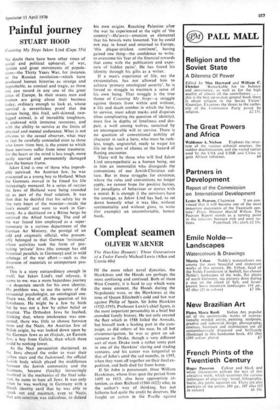Painful journey
STUART HOOD
Counting My Steps Jakov Lind (tape 35s) No doubt there have been other times of social and political upheaval, of war, famine and great movements of popula- tions—the Thirty Years War, for instance, or the Russian revolution—which have produced human histories as strange and improbable, as comical and tragic, as those one can record in any one of the great cities of Europe. In their streets men and women are going about their business today, ordinary enough to look at, whose survival is nevertheless proof that the human being, this frail, soft-skinned, two- legged animal, is of incredible toughness, is endowed with immense resources, and with the ability to survive at the limits of physical and mental endurance. What is not obvious to the casual observer, what may in fact be carefully concealed even to those who know them best, is the extent to which these survivors suffer from inner traumata; for the heart or the mind is less tough, more easily scarred and permanently damaged than the human frame.
Jakov Lind is one of those who improb- ably survived. An Austrian Jew, he was evacuated as a young boy to Holland. When the Germans moved in he found his life increasingly menaced. In a series of razzias the Jews of Holland were being rounded up as part of the final solution. It was then that he decided that his safety lay in 'the very heart of the monster—inside the lion's mouth' and went to work in Ger- many. As a deckhand on a Rhine barge he survived the Allied bombing. The end of the war found him employed as a super- numerary in a curious department of the German Air Ministry, the protégé of an odd and enigmatic official, who presum- ably belonged to that German 'resistance' whose activities took the form of pro- tecting 'private' Jews (the concept has old historical parallels in Germany) and in mild sabotage of the war effort — such as the diversion of materials to unimportant pro- jects.
This is a story extraordinary enough in itself; but Jakov Lind's real odyssey, it seems to me, was a more hazardous journey —a desperate search for his own identity. His problem was, to use the terms of the existential psychologist, an ontological one. There was, first of all, the question of his Jewishness. He might be a Jew by birth but he was not a Jew by either belief or practice. The Orthodox Jews he loathed, thinking that, where intolerance was con- cerned, there was little to choose between them and the Nazis. An Austrian Jew of Polish origin, he was looked down upon by the German Jews as an Ostjude, an Eastern Jew, a boy from Galicia, than which there could be nothing lower.
As the Nazi persecution sharpened, as the Jews obeyed the order to wear their yellow stars and the ludenraad, the official Jewish body which played the middleman between the Jewish community and the Germans, became (fatally) increasingly involved in the mechanics of the final solu- tion, he came to hate all Jews. It was only N% hen he was. working in Germany with a Dutch identity card that he was able to Speak out and maintain, even to Nazis, that anti-semitism was ridiculous, to defend his own origins. Reaching Palestine after the war he experienced at the sight of 'the country'—lia'aretz—emotion so elemental that his bowels were loosened. Yet he could not stay in Israel and returned to Europe, 'this plague-stricken continent', having gained one thing—the confidence to write, to overcome his 'fear of the financial rewards that come with the publication and expo- sure of hidden pains'. He has found his identity through his gifts as a writer.
If a man's experience of life, say the existentialists, has not allowed him to achieve 'primary ontological security', he is forced to struggle to maintain a sense of his own being. That struggle is the true theme of Counting My Steps—a struggle against threats from within and without, a life and death combat in which the hero, to survive, must adopt masks and disguises (thus complicating the question of identity), must live in depths of loneliness and des- pair, a wolf among wolves, sustained by an unconquerable will to survive. There is no question of conventional nobility of character in such a hero, who must be ruth- less, tough, ungrateful, ready to wager his life on the turn of chance or the hazard of fleeting encounter.
There will be those who will find Jakov Lind unsympathetic as a human being, see in him an immoralist who disregards the conventions of our Jewish-Christian cul- ture. But in these struggles for existence, where the rules and conventions no longer apply, we cannot hope for positive heroes, for paradigms of behaviour or stories with a moral. It is enough if the survivors have the courage, as Jakov Lind has had, to set down honestly what it was like, without sentimentality and without gloss, to write (for example) an uncomfortable, honest book.






































 Previous page
Previous page